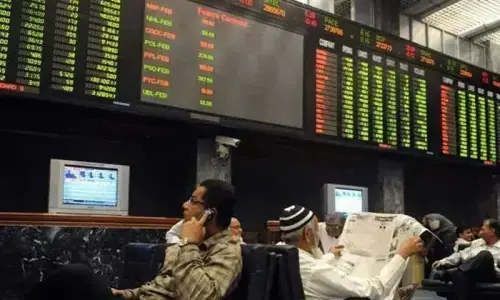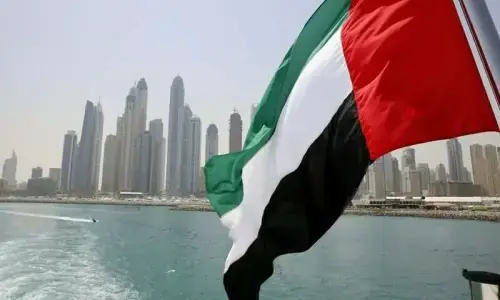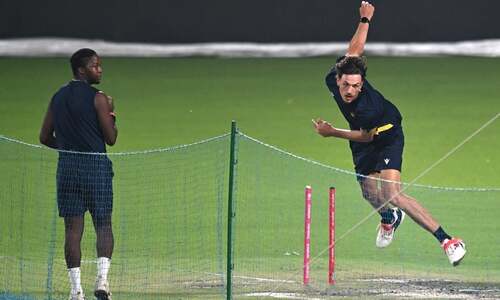Foreign Minister Bilawal Bhutto-Zardari hailed on Friday his trip to India as a “success”, saying that the “false propaganda” of the Bharatiya Janata Party (BJP) that every Muslim was a terrorist had been negated.
The foreign minister made these remarks upon his return to Pakistan from India, where he spoke at the Shanghai Cooperation Organisation’s (SCO) Council of Foreign Ministers (CFM) moot earlier today.
Addressing the media in Karachi, Bilawal said: “The BJP and Rashtriya Swayamsevak Sangh (a Hindu nationalist group in India) have been trying to create this myth — they declare Muslims across the world terrorists, they declare Pakistanis terrorists.
“We made an attempt at breaking this myth.”
He added, “I believe that when the son of Shaheed Mohatarma Benazir Bhutto’s son sits before them, no matter how much they try to level such allegations, this is a reply enough for them.”
The foreign minister said his party, the PPP, forwarded Hindu candidates for provincial and federal legislatures who went on to become ministers, adding that he was “surprised” to learn that the Bharatiya Janata Party had no Muslim candidate despite India having one of the biggest Muslim population in the world.
Bilawal was also asked about Indian Minister of External Affairs S. Jaishankar’s comments about him, where the dignitary from New Delhi reacted to the PPP chairperson urging SCO members to refrain from “weaponising terrorism for diplomatic point scoring”.
Jaishankar said Bilawal’s address “reveals the mindset of that country. His position was found out and called out.”
To a question about Jaishankar’s remarks, the foreign minister said, “I understand there is insecurity behind this criticism.”
The reason for this insecurity, he continued, was that a “false narrative, propaganda and lie” was being spread in India, particularly by the BJP.
“By going there and speaking and presenting our stance, we broke that myth and propaganda.
“They try to give the impression that every Muslim is a terrorist so that hatred spreads there (India) and they could win elections. They try to prove that every Pakistani is a terrorist, but when Bilawal Bhutto-Zardari sits before them, their false narrative and propaganda are negated even if I say nothing,” he added.
Pressing further, FM Bilawal termed Jaishankar’s comments about him being a perpetrator of terrorism as a “joke”.
“This country knows me, have I once even in my political history accidentally sat down with a terrorist? What can I do if their hate has reached this height that they want to declare all Muslims as terrorists, even me?
“They don’t see that even in our country we (PPP) perform a role in the first ranks against appeasing terrorists,” the foreign minister said.
Bilawal said he did not want any Pakistani, Indian or citizen of any other country to fall victim to terrorism, adding that people would continue dying “until we keep politicising this issue and become part of the geopolitical game being played in the world and this region”.
The foreign minister said a “bipartisan approach across the geopolitical divide” was needed to address terrorism. “We will have to combat it together as one and will keep being victims to it if we remain divided,” he added.
He said the narrative that terrorism was linked to Muslims had become “stale” across the world and Pakistan’s sacrifices in the fight against terrorism were acknowledged by the world.
Bilawal went on to say that another “lie” that India was trying to spread was that the United Nations Security Council’s resolutions, international laws and bilateral agreements held no importance, adding that Pakistan’s representatives continued to counter India’s narrative on Kashmir.
He said that what frustrated India was the refusal of Pakistanis and Kashmiris to accept the Indian government’s actions of August 5, 2019, when it revoked occupied Kashmir’s special status, adding that the development had instead given “new life” to the Kashmir cause.
“As Pakistan’s representatives, we talk on terrorism and Kashmir, counter their (India) propaganda and one-sided message so that is why maybe the Indian FM seemed so emotional to you in his press conference,” FM Bilawal said.
He said Pakistan and India had held talks before despite instances of terrorism so the two would now have to decide “will we allow these terrorists and non-state actors to determine decisions of our citizens’ fate of or will we ourselves chart the course of our future.”
Bilawal questioned how long India could deny international laws and UNSC resolutions or how long it could run away from a plebiscite in Kashmir.
“I think the arc of history is long but ultimately it bends towards justice. We will find a solution, if we decide beforehand that we don’t like their face and won’t even go to multilateral [events] and SCO then tomorrow we won’t go to the UN or other places and will keep closing doors for ourselves.
“So this decision I made to go was in that context. We went and left a footprint, in future maybe someone else can find a solution while walking on those footprints,” he said.
The foreign minister also provided an update on Pakistan’s evacuation operations from Sudan, adding that the last batch of evacuees would reach tonight and all in all the Foreign Office had successfully managed to take out all 1,050 Pakistanis from the war-torn country.
The foreign minister also pointed towards enthusiasm in the SCO member states regarding the China Pakistan Economic Corridor (Cpec), except India, and said they were “keen” to become a part of it.
“They know it’s the fastest route to warm waters for them and their trade. This whole regional integration purpose moves forward when Cpec runs otherwise there is a difficulty.”
FM Bilawal also lauded the growing importance of the SCO forum and said it would become a “regional powerhouse” tomorrow if not today.
Earlier during the press briefing, Bilawal said he had presented Pakistan’s stance at the SCO summit, and in that regard, “I think the trip was very successful”.
‘Onus on India to build conducive environment for talks’
Earlier, speaking to journalists in India, he said that the onus was on India to build a “conducive environment for talks”, as he contended that dialogue between the two countries was hurt by New Delhi’s decision to end occupied Kashmir’s special status.
Speaking to journalists after the meeting, Bilawal said that the PPP had always advocated normalisation of relations with India but the latter’s “unilateral and illegal” actions pertaining to held Kashmir on August 5, 2019, had violated international law, United Nations resolutions and bilateral agreements.
Hence, he stated, it was Pakistan’s “principled position” that the status quo of August 4, 2019, was withdrawn as India’s actions had “really undermined the environment and now the onus is on India that they create the conducive environment in which talks can be held”.
Bilawal said there was a “trust deficit” ever since India violated previous agreements, asserting that there could be no change in the policy on diplomatic relations with India till the latter reverted to Kashmir’s position on August 4, 2019.
In response to a question on India’s decision to host G20 meetings in occupied Kashmir, he said: “Obviously we condemn it and at the time we will give such a response that it will be remembered.”
He said holding the meetings in the disputed territory showed India’s “pettiness” and was “a show of arrogance to the world that to hell with international law, UNSC resolutions and bilateral agreements, India will hold its events in Kashmir”.
FM Bilawal added that India would soon find that “they will be unable to achieve 110 per cent attendance because other people will not compromise on their morals”.
Talking about the ongoing tensions between the two countries in the realm of sports, particularly India’s refusal to visit Pakistan for Asia Cup 2023 and its demand for a neutral venue, Bilawal said: “I believe we shouldn’t hold sports hostage to politics or foreign policy and the purpose of sports is that you keep it away from such issues.”
He said it would be “very petty” of India if it kept sports hostage to politics. “The hope is that a petty action won’t be taken and we should keep our sportsmen and crickets separate from politics and foreign policy,” he added.
Responding to a question on the World Cup 2023 and if Pakistan would send its players for the tournament, the foreign minister said: “I hope that we’re in a position to not have sports suffer as a result [of our bilateral issues].”
“Peace is our destiny’
At the same time, the foreign minister also said that the two countries could not be held hostage by history.
“In our heart of hearts, most Pakistanis … and most Indians … want us to live in peace and peace is our destiny,” he said. “God willing, what could not happen in the past, our generation will not be held by history but we will create our own history.”
The foreign minister said that India and its media’s interest in his visit to Goa reflected an interest in Pakistan, reiterating that both nations desired peace, improvement in ties and mutual progress in the subcontinent.
The foreign minister hoped that when Pakistan chairs the SCO in 2026, India would take a good step to participate in the summit on the basis of “reciprocal diplomatic agreements”.
I believe the Indian foreign minister would be met with an equivalent amount of interest from the Pakistani media and people, he added.
Talking about his interactions with Indian Minister of External Affairs Subrahmanyam Jaishankar, FM Bilawal said that it was “no problem for me on camera” and that his Indian counterpart should be asked if he had any issues.
He said the way they met was similar to how people greeted each other in Sindh and Multan so “it was a moment of happiness for me that we were greeting each other the same way”.
Acknowledging the dilemma of his Indian counterpart, Bilawal said Jaishankar was “damned if he does and damned if he doesn’t” in regards to cordially greeting him.
“He greeted everyone the same way and there was no distinction in how Pakistan and how others were treated so I don’t think it is merited for us to complain.
“Whenever we meet, for dinner or anything, there are handshakes and pleasantries exchanged. We are civil, not uncivilised and fighting doesn’t start immediately as soon as we spot each other. When we are working in our professional capacity he has to present his country’s stance and I mine.”
He said that if — in the course of those professional obligations — they had a back-and-forth, it was not due to any personal issues but simply them doing their jobs.
“As for our talks with each other and dinner, I wouldn’t read too much into it,” the minister added.
FM Bilawal praised the management of the SCO function, particularly noting Pakistan’s representation in the cultural event and appreciated India’s responsibilities as the host and chair.
“I think Jaishankar sahab lived up to those duties and he didn’t let me feel at any time that there was any impact on this conference due to our bilateral differences.”
‘Let’s not weaponise terrorism for diplomatic point-scoring’
Earlier in the day, the foreign minister also emphasised the importance of greater cooperation among SCO countries in tackling terrorism, calling for joint efforts to address the root causes of the issue.
“The collective security of our peoples is our joint responsibility. […] Let’s not get caught up in weaponising terrorism for diplomatic point scoring,” the Foreign Office (FO) quoted Bilawal as saying.
Bilawal’s address touched upon the issue of terrorism and Islamabad’s commitment to Afghanistan.
The FO, in a Twitter thread, quoted Bilawal as saying, “Unilateral and illegal measures by states in violation of international law and Security Council resolutions run counter to the SCO objectives”.
“When great powers play the role of peacemaker, we can unlock the potential of peace while paving the way for greater cooperation, regional integration and economic opportunities for our peoples,” he added.
Bilawal also stressed upon the SCO’s importance for Pakistan: “There couldn’t be a more powerful indication of the importance that Pakistan attaches to the SCO than my presence here in Goa for this CFM.”
The minister asserted the SCO could be a “key platform for taking the vision of Eurasian connectivity to the next level”, the FO said.
The FO further quoted him reiterating Pakistan’s belief and adherence to the “principles of mutual trust, equality, respect for cultural diversity, and the pursuit of shared development enshrined in the original ‘Shanghai Spirit’”.
The minister asserted Pakistan’s commitment to multilateralism and said it “continues to play a leading role at all international forums”.
Speaking on Afghanistan, Bilawal said, “A peaceful and stable Afghanistan is a key not only to regional integration and economic cooperation but also to global peace and stability.”
Citing Pakistan’s proposal to establish the Special Working Group on Poverty Alleviation, Bilawal advocated for closer cooperation for poverty alleviation under the SCO, the FO said.
The foreign minister once again highlighted Pakistan’s role in the global discourse on climate change. He further said, “The climate crisis poses an existential threat to humanity.”
He further highlighted the SCO’s role as an intergovernmental organisation and said the platform had promoted “mutual understanding, security and development through constructive and mutually beneficial cooperation”.
The FO also shared a photo of Jaishankar welcoming Bilawal to today’s CFM meeting. A video of the occasion shows the Indian minister welcoming Bilawal with a Namaste — a customary Indian gesture of respectfully greeting a person — and the latter reciprocating it.
Indian FM highlights ‘menace of terrorism’
Meanwhile, Indian Minister of External Affairs S. Jaishankar, in his address to the SCO meeting, highlighted the issue of cross-border terrorism.
According to the Hindustan Times, Jaishankar said: “While the world was engaged in facing Covid and its consequences, the menace of terrorism continues unabated. Taking our eyes off this menace would be detrimental to our security interests.
“We firmly believe that there can be no justification for terrorism and it must be stopped in all its forms and manifestations, including cross-border terrorism,” Jaishankar said.
He further called for the “channel of activities for terrorist activities” to be “seized and blocked without distinction”.
The Indian news agency quoted the minister as saying, “Members need not be reminded that combating terrorism is one of the original mandates of the SCO.”
Jaishankar noted that the unfolding situation in Afghanistan following the Taliban’s return to power “remains at the centre of our attention”, adding that the efforts should be directed towards the welfare of the Afghan people, the Hindustan Times said.
Bilawal meets his Tajikistani counterpart
On the sidelines of the SCO meeting, Bilawal met Tajikistani Foreign Minister Sirojiddin Muhriddin, the FO said in a statement.
The ministers discussed a broad spectrum of bilateral relations and agreed to further strengthen economic ties and the early completion of connectivity projects, in particular, the CASA-1000, the FO said.
Bilawal also shared a video from the meeting, which showed the ministers participating in the meeting along with their delegations.
Along with the subject of economic cooperation, Bilawal said he also discussed the regional situation around Afghanistan.
The FO shared a group photo of the foreign ministers attending the SCO meeting today. The SCO comprises eight member states — Pakistan, India, China, Russia, Tajikistan, Uzbekistan, Kazakhstan and Kyrgyzstan.
Visit to India
A day ago, on the first day of his visit to India, Bilawal had met Russian Foreign Minister Sergey Lavrov, SCO Secretary General Zhang Ming, and Uzbek Foreign Minister Bakhtiyor Saidov, the FO had said on Twitter.
Following his arrival, the minister had said he was “happy” to be arriving in Goa for the SCO and that he expected the CFM meeting to be “successful”.
Bilawal’s trip is the first visit to India by a foreign minister of Pakistan since July 2011, when then-foreign minister Hina Rabbani Khar visited for peace talks.
The visit comes at a time when the relationship between the two nuclear-armed arch-rivals has nosedived over a combination of factors.
Pakistan has already made it clear that the foreign minister during his visit will not hold any bilateral meeting with his Indian counterpart.
Bilawal has also dismissed speculation surrounding his upcoming trip, saying it should not be interpreted as a sign of improved bilateral ties between the two neighbouring countries.
He clarified that he had not requested a meeting with Indian Prime Minister Narendra Modi, emphasising that the visit should be seen in the context of the SCO meeting.
In addition to deliberating upon important regional and international issues and signing some of the institutional documents, the CFM will finalise the agenda and decisions to be adopted by the 17th SCO Council of Heads of State Meeting, scheduled to take place in New Delhi on July 3-4, 2023.
Additional input from AFP
































